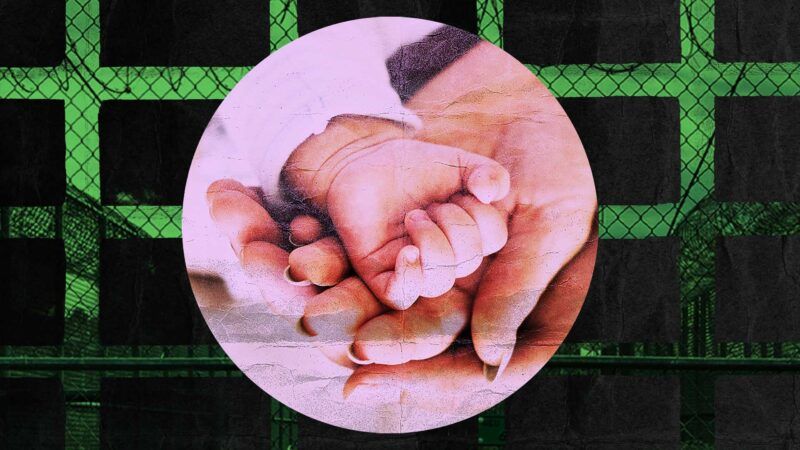This Woman Served 11 Years in Prison on a Marijuana Charge. She's Been Sent Back Over a Clerical Error.
Raquel Esquivel, convicted of a nonviolent drug offense in 2009, was put on home confinement during COVID-19.

In May 2020, after more than a decade behind bars on a drug charge, Raquel Esquivel was on her way out of a federal correctional institution, having been granted release to home confinement during the COVID-19 pandemic. Almost a year later, she was on her way back, thanks to an administrative error at the halfway house contracted to monitor her.
She has not left custody since. The one exception: a trip to the hospital last week to give birth to the baby she conceived during her tenure outside prison walls.
Over the last year and a half, thousands of low-risk inmates were given the chance to serve the remainder of their sentences on home confinement. The move was meant to curb coronavirus transmission rates in overcrowded prisons. But the trial period has been viewed as a successful tactic beyond that of a COVID mitigation measure; of the approximately 4,500 released due to COVID, just three have reoffended, two of whom committed nonviolent crimes, according to Michael Carvajal, director of the Federal Bureau of Prisons (BOP).
In 2008, Esquivel was arrested amid allegations that she used her position as a Border Patrol agent to help a marijuana dealer, Diego Esquivel (no relation), sneak drugs across the border. The two had some sort of tryst. In 2009, Raquel was convicted of conspiracy to possess with intent to distribute marijuana after the U.S. accused her of telling Diego where sensors were so that he could smuggle in cannabis undetected from Mexico. She has maintained her innocence and said that a benign conversation was weaponized by Diego under oath to swing a lesser punishment.
"I want to get my sentence reduced," he said while testifying against Raquel, according to a 2016 Texas Tribune piece. He described her involvement as follows: "I asked her a couple questions and she answered them." Diego received seven years' imprisonment and has since been released, as have his two accomplices. But Raquel remains incarcerated, at least in part due to the incompetence of Dismas Charities Halfway House.
Home confinement is no cakewalk: The BOP contracted Dismas to track Esquivel's every move, requiring that she phone them multiple times a day and hamstringing her travel so that she could pretty much only go to her bookkeeping job and the occasional Walmart shopping trip (for which she needed special permission). Esquivel says she executed those calls faithfully, so she was confused when Dismas called her out of the blue and told her to report there without delay. She was under investigation for missing one of her check-ins—a call she insists she made, and had a record of.
Esquivel's phone record swayed Dismas; perhaps the person who took her call neglected to log it. It wouldn't be the first case of bureaucratic incompetence and corruption on the part of the halfway house. But it was too late, as Dismas had already reported it to the BOP, which took her back into custody in May. A judge declined to recognize her new attorney and her compassionate release petition was thus never heard, so she will remain behind bars until March 2022, when her sentence finally expires.
"I just can't believe that they thought it was worth it," says Kevin Ring, director of FAMM, a criminal justice advocacy group. "Even if she did something, you still have the cost-benefit of bringing a very pregnant woman to [prison] where people have died of COVID." Ring presents the conservative argument for home confinement: "It's almost impossible to believe that we do that. And anybody who considers themselves pro-family, or concerned about children, would [not] think that she should be separated from her newborn child." Home confinement also saves money, and a lot of it. The average annual price for a prisoner at home is $13,000; for an inmate at a correctional institution, it is almost 3 times higher at $37,500.*
Esquivel is not the first prisoner taxpayers have had to subsidize over a phone call. In July, Jeffrey A. Martinovich, who was convicted of white-collar offenses, failed to answer the phone one evening on home confinement and was sent back to prison for four years, where he remains. Martinovich, like Esquivel, was labeled an escapee, as if he had literally broken out of prison, despite the fact that his GPS monitoring equipment showed he was in his house that night where he was supposed to be. And there was the much-publicized case of Gwen Levi, the 76-year-old woman who earlier this year was put back behind bars after missing a call from officials while she was in a word processing class. (She was later released.)
Last month, the Biden administration indicated that federal drug offenders would receive clemency applications if they'd been placed on home confinement due to COVID and had less than four years left on their sentence. At one point, that would have been good news for Esquivel—though if she ever caught wind of it, she did so from inside FMC Carswell.
*CORRECTION: The original version of this piece misstated the multiplier for the difference in price between home and in-person confinement.


Show Comments (46)